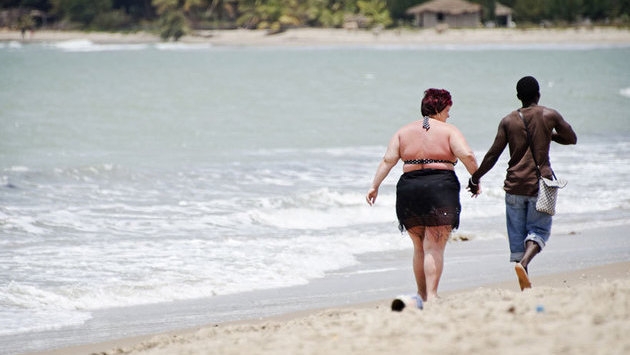Uncle Tom finds out about fund raising in the Gambia.
I was interviewing activists in Banjul, Gambia, about their careful efforts to mobilise against that ‘fat white chicken’ dictator Jammeh, when one of them suddenly suggested going to the beach. I was game and so were the others in the group. The regime and its secret service might be oppressive and vicious, but, hey, the place is also just all beaches and palm trees and sunshine. And even the most dedicated guerrilla fighter needs some fun sometimes, as good old Che Guevara used to say.
We were chilling and having some beers when I noticed that our group of five had thinned somewhat. Hamadou and Momar were leisurely strolling along the coast line, toying around with a beach ball they had brought. I was happy to see that since I knew how they had sweated over the printing of their anti-Jammeh pamphlets into the early hours of the morning. I waved, but they weren’t looking at me. They were heading for a group of white ladies sitting nearby on beach chairs and holding cocktails. Half a minute later they were sitting with them, laughing and chatting away.
I asked the others if they knew these ladies, but they only started giggling and I understood. I had read about such middle-aged women from Europe visiting Gambia. There was an article, recently, written from somewhere in the Netherlands (it didn’t name an author, but it was in Dutch), that vehemently denounced such ‘sex tourism’. It said that these ladies were cruelly exploiting young men’s poverty and that such victims of sexual abuse by ‘grannies’ really had no choice but to go along with their wealthy white desires. After all, there was no other job for them in the Gambia, so it was a kind of slavery.
I had laughed at one comment under the article, that said that the young men were clearly in need of dollars and euros, and maybe it was preferable if they got these on an old bicycle, rather than by travelling the Mediterranean in a leaking boat.
I asked the other three in our group, -Birame, Cheikh and Adia, the only female- what they thought. Were Momar and Hamadou being –or about to be- exploited? And was it even right for a political activist to behave this way? Birame laughed and said that well, it was one way to get your little brothers and sisters through school. “And some of these ladies are not ugly at all.” More seriously, Adia explained that some of the group’s conquests –‘not only women, by the way’- were sending money every month which they used for mobile phones and printer ink. Adia added that she, personally, would not easily go with strangers for money, but that her mother did and that it got her family out of poverty, “so what’s the problem?”
I mentioned what the article had said and she thought about it for a while. “But if these ladies stop coming then we won’t have money to educate ourselves and change this country,” she said then. “And no good times,” Birame said wickedly, looking at Adia, with her glasses and her long sleeves. “We are not getting any fun from you, are we?”


